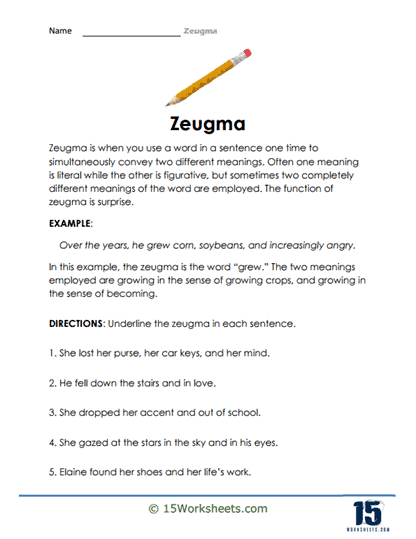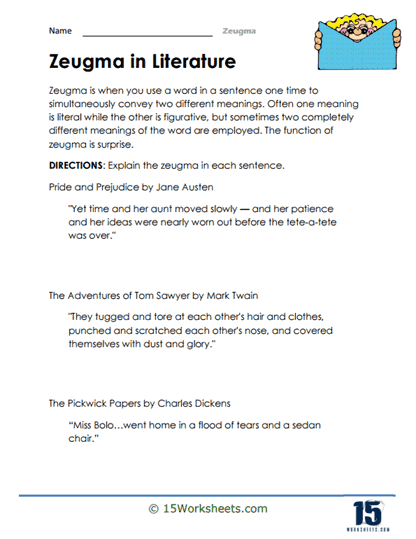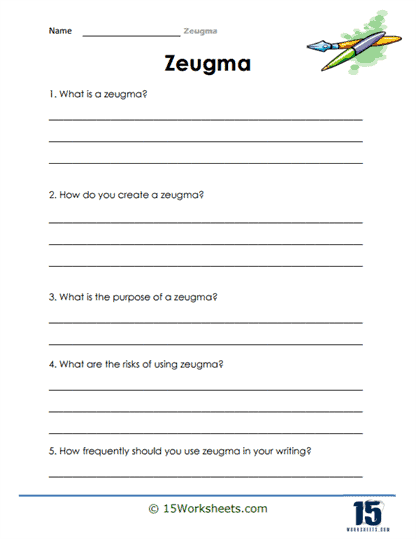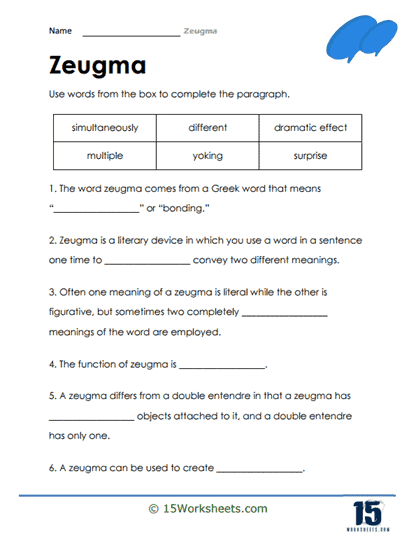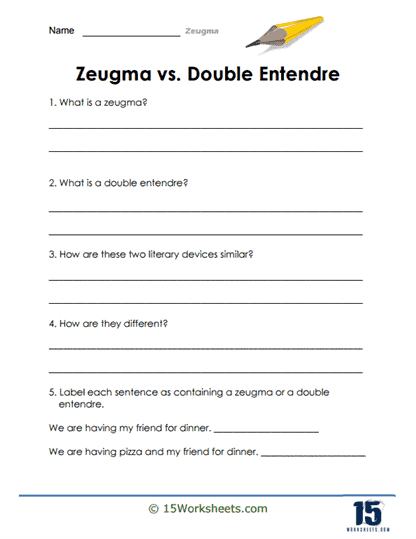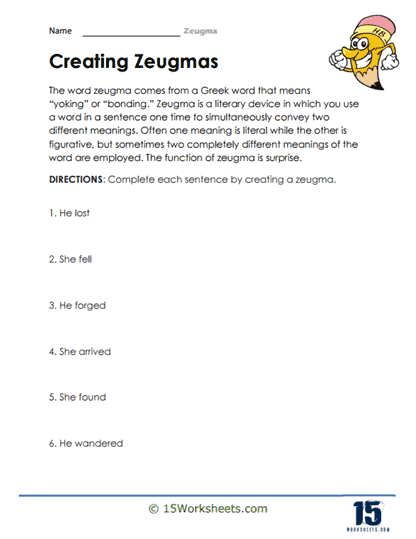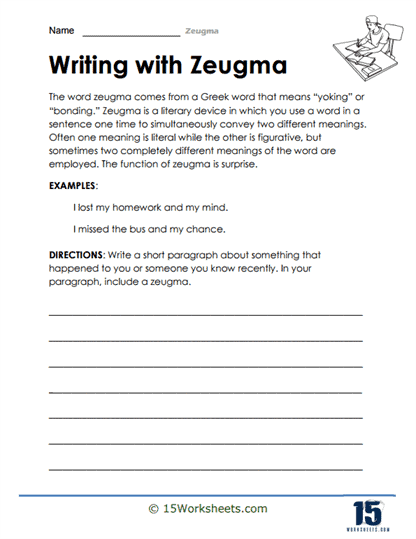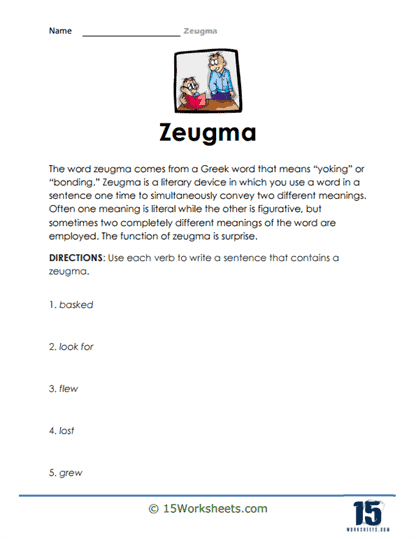Zeugma Worksheets
About These 15 Worksheets
These worksheets will help to enhance students’ understanding and appreciation of the literary device known as zeugma. Zeugma involves using a single word (usually a verb or an adjective) to modify or govern two or more words, although its direct relationship applies differently to each item. This device often adds flair, efficiency, and a layer of depth to writing, making the exploration of zeugma both a linguistic and creative exercise. By working with Zeugma Worksheets, students can significantly bolster their language arts and reading skills, including their ability to recognize and analyze sophisticated rhetorical strategies, improve their creative and analytical writing abilities, and deepen their comprehension and appreciation of literature.
Through a variety of exercises focused on identification, analysis, creation, comparison, transformation, and contextual usage, students can enhance their language arts and reading skills significantly. Not only do these worksheets improve analytical and creative writing abilities, but they also contribute to better reading comprehension, vocabulary expansion, and a heightened engagement with texts. Moreover, the critical thinking skills developed through working with Zeugma Worksheets have a lasting impact on students’ academic and personal growth. Engaging with the linguistic intricacies and creative potential of zeugma prepares students not only for academic success but also for a lifetime of appreciating and utilizing the richness of language.
Types of Exercises
Identification Exercises
These exercises task students with identifying zeugmas in given sentences or passages. By pinpointing and highlighting the use of zeugma, students learn to recognize how a single word can operate in multiple contexts, enhancing their analytical reading skills. In these exercises, students explore the use of zeugma in various literary genres and contexts. They might analyze how zeugma contributes to character development in a novel, the persuasive impact in a speech, or the emotional depth in poetry. This broadens their appreciation of zeugma’s versatility across different forms of writing.
Analysis Exercises
Here, students analyze the effect of the zeugma in a sentence or passage. They explore how the zeugma influences meaning, tone, and the reader’s experience. This deepens students’ understanding of how language can be manipulated for stylistic purposes and to convey complex ideas efficiently. Students are prompted to create their own sentences or short paragraphs using zeugma. This encourages creativity and helps students practice applying this rhetorical device in their writing, fostering a more sophisticated writing style.
Comparison Exercises
These activities involve comparing sentences or passages with and without zeugma. Students assess how the presence or absence of zeugma affects clarity, conciseness, humor, or emotional impact, thereby understanding the strategic use of language in writing. Students are given sentences that do not contain zeugma and are asked to rewrite them to include a zeugma. This challenges students to think creatively and apply their understanding of the device in modifying sentence structure for stylistic effect.
The Benefits Of These Worksheets
Enhanced Analytical Skills
By identifying and analyzing zeugma, students sharpen their analytical skills, learning to discern subtle nuances in language and appreciate the complexity of literary devices. This analytical acumen transfers to other areas of study, enriching their academic experience.
Creative Writing Development
Creation exercises encourage students to experiment with language and structure, thereby fostering creativity. Practicing with zeugma can lead to more dynamic and expressive writing, as students learn to play with words and meanings in innovative ways.
Improved Comprehension
As students become more familiar with zeugma and other rhetorical devices, their ability to understand complex texts improves. They gain a deeper appreciation for the craft of writing and the various strategies authors use to convey meaning and emotion. Working with zeugma inherently involves exploring a range of verbs and adjectives in different contexts, aiding in vocabulary development. A broader vocabulary enhances both reading comprehension and expressive capability.
Increased Engagement with Texts
The playful nature of zeugma can make reading and writing more engaging for students. Recognizing witty or clever use of language in literature can transform the reading experience, making it more enjoyable and stimulating. Zeugma worksheets often require students to think critically about language use, the purpose of specific literary devices, and the effect they have on the reader. This fosters a mindset that is questioning, reflective, and deeply engaged with the material.
What is the Literary Device of Zeugma?
The literary device of zeugma, a fascinating and sophisticated element of writing, captivates both the mind and the imagination of its audience. At its core, zeugma involves a single word, typically a verb or an adjective, that governs or modifies two or more words, although its direct connection to each may vary significantly. This unique construction allows for a range of expressive and stylistic effects, making zeugma a favored tool among authors seeking to add depth, humor, or efficiency to their prose or poetry.
The Main Defining Feature of a Zeugma
The primary hallmark of zeugma is its efficiency in linking disparate elements through a common word, creating a concise and often surprising juxtaposition. This device hinges on the polysemic nature of language, where a single word can possess multiple meanings or applications. The beauty of zeugma lies in its ability to forge these connections in unexpected or unorthodox ways, leading to expressions that are as intellectually engaging as they are aesthetically pleasing.
Characteristics of a Zeugma
Economy of Language – Zeugma achieves maximum effect with minimal words, encapsulating complex ideas or images within a single, elegantly constructed sentence.
Semantic Flexibility – The device relies on the flexibility of language, using the polysemy of words to apply them across different contexts simultaneously.
Surprise and Wit – Often, the pleasure of zeugma comes from the unexpectedness of the connection it establishes, revealing the author’s wit and ingenuity.
Emotional Range – While frequently employed for humor, zeugma can also convey a broad spectrum of emotions, including pathos, by juxtaposing contrasting ideas or images.
Stylistic Versatility – Zeugma can be adapted to a wide range of styles and genres, from the most formal academic prose to the casual banter of dialogue in fiction.
Examples of Zeugma in Literature
William Shakespeare’s “Macbeth” – In Act 1, Scene 7, Macbeth uses a zeugma when he says, “We will proceed no further in this business – / He hath honour’d me of late; and I have bought / Golden opinions from all sorts of people, / Which would be worn now in their newest gloss, / Not cast aside so soon Here, “bought” governs both “golden opinions” and a subtle reference to “honour Shakespeare’s use of zeugma emphasizes Macbeth’s internal conflict between ambition and loyalty, highlighting how his honor and the favorable opinions of others are both at stake, yet cannot be easily discarded like new clothes.
Alexander Pope’s “The Rape of the Lock” – Pope offers a playful example of zeugma in his mock-epic poem – “Or stain her honour, or her new brocade The verb “stain” applies both to the physical staining of the brocade and the metaphorical staining of the woman’s honor, cleverly linking the triviality of fashion with the seriousness of personal virtue. Pope’s use of zeugma here critiques the superficial values of his society, mocking the equal weight given to material appearance and moral integrity.
Charles Dickens’s “David Copperfield” – Dickens employs zeugma for both humor and characterization when he writes, “Mr. Murdstone made the punch with great care and solemnity, but never permitted himself to be so far reconciled to it as to drink it The verb “made” humorously connects the physical act of preparing the punch with the abstention from drinking it, highlighting Mr. Murdstone’s stern and abstemious nature in a way that invites both laughter and a deeper understanding of his character.
Effect of Zeugma on the Reader
The impact of zeugma on readers is multifaceted. Intellectually, it demands engagement, as the audience must navigate the multiple meanings or applications of a single word within a sentence. This cognitive exercise not only entertains but also enriches the reader’s understanding of language’s flexibility and depth.
Emotionally, zeugma can evoke a wide range of responses, from the delight of recognizing clever wordplay to the profound reflection prompted by an unexpected juxtaposition of ideas. The surprise element inherent in zeugma contributes to its effectiveness as a literary device, as readers often find joy or insight in the unanticipated connections it reveals.
Aesthetically, zeugma adds a layer of polish and sophistication to writing, demonstrating an author’s mastery over language. It serves as a testament to the creativity and thoughtfulness invested in the text, enhancing the reader’s appreciation of the author’s skill and intention.

